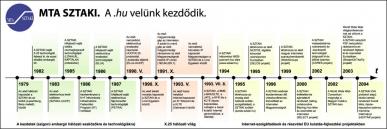Established in 1994, SZTAKI DSD (Department of Distributed Systems) played a pioneering role in the introduction and application of the Internet and WWW technologies in Hungary. Since the mid-90s DSD has specialized in the research and development of artificial intelligence, internet science, digital library and archiving systems, distributed knowledge management, distributed computer systems, applications and middleware including World Wide Web-based software systems, web, semantic web, groupware applications and services, CSCW, digital art projects and mobile computing.
In the picture below DSD scientific areas are introduced which, based on web, cloud and several other technologies, and enforced by the three DSD-specific pillars, support our present work related to artificial intelligence and internet science.

DSD gives priority to the planning and development of distributed network infrastructures that support the research and development of AI (artificial intelligence), and to the research and development regarding the special services of data management tasks in these infrastructures.

Infrastructural approach enables DSD to directly apply its know-how created in the areas of data management, graph-based knowledge management and semantic web, and to integrate it into a unified research and development supporting system.

DSD develops specialized artificial intelligence solutions and applications for data filtering and data cleansing particularly related to research data handling.
Facing today’s challenges regarding the load and diversity of information and digital content, DSD is actively involved in the research and development (methods, technologies, applications) of digital library and archiving systems, repositories, metadata registers, semantic data management and data storage services (nowadays, most significantly for artificial intelligence) which aim at ensuring usability, accessibility, scalability and long-term preservation.

Current activities of DSD involve, with the help of virtualization methodology and middleware software, and using cloud or cloud related network services (cloud, fog, edge, P2P computing), the development of knowledge management systems, semantic web, linked data architectures, platforms, methods and tools that enable content awareness, personalization and dynamic service- and datafusion.
DSD also initiates research to form the service system for the Internet of the Future. It has also conducted research and development in the architectural, functional and user interface aspects of groupware including calendar/agenda applications, group based project management systems, workflow systems, meeting support systems, discussion forums, decision support and voting systems.

Our mission
Our main task is to find solutions to problems where such unique and special IT knowledge is needed where only few try. We take the challenge to enter research and development projects, where interdisciplinarity inside and out of informatics is inevitable, and where our colleagues can show their wide range of expertise, interests and experience.
Great emphasis is put on reliability: DSD would rather not undertake a task if we are not absolutely certain that a solution of outstanding quality is delivered on time. However, high quality solutions are not presented only on commission or due to project obligations. During „in-between-projects” time several, for the Hungarian society, important and useful activities have taken place – not as if our projects have been fruitless. As a result, among others, the most popular Hungarian on-line dictionary service SZTAKI Szótár was created in 1994, serving 40,000 users every day.
DSD develops complex systems, let them be either abstract (theoretical fundamental research) or operating and complicated software systems along the paradigm of post-academic scientific research and knowledge creation. When developing systems, we mainly use JAVA, Javascript, PHP, SQL, SPARQL, JSON, but we may also turn to other technologies. Rarely we use PERL, but deny it afterwards.
DSD in numbers
DSD activities in the past 25 years are presented in the referenced page with the help of infographics: projects, technologies applied to develop systems, international and Hungarian partnerships are displayed on several charts, and put on a map and timeline.
Actual keywords of DSD
artificial intelligence, reinforced learning, learning algorithm, research data handling, collaborative knowledge management, knowledge graph, RDF, RDFS, OWL, LLD (Library Linked Data), LOD (Linked Open Data), SKOS, cloud, fog, and edge system, semantic web and semantic web services, ontology, distributed system, context-awareness, mobile application, social computing, CSCW, groupware application, multi-criteria group decision support system, P2P, peer-to-peer, SOA, service-oriented architecture, SLA, digital library, digital archive, Dublin Core, long-term digital preservation
On-going R&D projects
The Department of Distributed Systems (DSD) has been participating in the following EC funded and other projects as research and development partner:
- DKG: Distributed Knowledge Graphs
- CONCORDA: Concentrated Cooperation on Research Data
- MTMT2: Hungarian Scientific Bibliography 2.0 development
- W3C-HU: World Wide Web Consortium Hungarian Office
- ARP: ELKH Data Repository project
- DIWAS: Digital Work Assitant
- iToBoS: Intelligent Total Body Scanner for Early Detection of Melanoma
Past projects
- SYMBIO-TIC: SYMBIO-TIC
- COURAGE: Cultural Opposition – Understanding the CultuRal HeritAGE of Dissent in the Former Socialist Countries
- SZTAKIMemory: SZTAKIMemory - Non Deletable Digital Archive System as Institutional Memory
- Share-PSI 2.0: Shared Standards for Open Data and Public Sector Information
- Chaoster: Context-aware collaboration platform for crisis/chaos management based on the concept of emergent interoperability
- TolmacsKesztyu: InterpreterGlove
- BonFIRE: Building service testbeds on FIRE
- VISIONAIR: VISION Advanced Infrastructure for Research
- ChaosFIRE: ChaosFIRE - Fed4Fire Innovative Experiment for Measuring Effectiveness of an Opportunistic Network Platform for Sensor Data Collection and Distribution
- MunkaPad: Integrated eScience platform based on LOD
- NextGeneration: The next generation of scientific journals
- DONAU: RICOH-SZTAKI collaboration
- SZTAKI Dictionary 4.0: SZTAKI Dictionary's major rewrite
- KOPI-Trans: Translational plagiarism
- CrossMedia: CrossMedia Semantic Annotation and Search service
- CloudBricks EU FP7 proposal preparation: CloudBricks - Simplifying Cloud-usage and expanding its availability with a building-block-style approach - EU FP7 proposal preparation
- S-CUBE: European Network of Excellence in Software Services and Systems
- N-Cloud: Nuance-SZTAKI cooperation
- BREIN: Business objective driven reliable and intelligent Grids for real business
- T-ONE: Methodology for ergonomic web development and design
- ILI: Intelligent Visitor Guidance
- ABILITIES: Application Bus for InteroperabiLITy In enlarged Europe SMEs
- DELOS NoE: DELOS Network of Excellence on Digital Libraries
- Meta-contentum: META-CONTENTUM R&D Project
- INFRAWEBS: Intelligent Framework for Generating Open (Adaptable) Development Platforms for Web-Service Enabled Applications Using Semantic Web Technologies, Distributed Decision Support Units and Multi-Agent-Systems
- MIK: MIK 3.1.2. Service and Application Development for Mobile systems
- ORG: National Cancer Registry GRID
- T-SOA: Concurrent Transaction Handling in Service Oriented Architectures
- T-Intra: Hungarian Telekom Intranet Forum System
- GeneSyS: Generic Systems Supervision
- MOVOT: Modernization Of Electronic Voting Procedures
- EUTIST-AMI: European Take-Up of Essential Information Society Technologies
- StreamOnTheFly: Personalized Community Radio Program with Collaborative Filtering Agents and Bandwidth Sensitive Streaming
- PublicVoiceXML: VoiceXML Trial for an Open Source Reference Implementation
- Kaposvar: Demand Driven Information Tools for E-Administration
- HEKTAR: Applying open digital library recommandations to Hungarian electronic libraries.
- KOPI: KOPI Online Plagiarism Search and Information Portal
- PROMOCIO: Proactive Multimodal Collaboration and Monitoring Platform for Independent Organizations
- Cogitatio: Decision Support Based on Argument Mapping
- Web4Groups: Transfer of Knowledge between Research, Education, Business and Public Administration through the World Wide Web
- DELOS NoE FP5: DELOS Network of Excellence
- DELOS: DELOS
- SELECT: Metadata Architecture for Rating, Filtering & Recommender Services
- CORES: A Forum on Shared Metadata Vocabularies
- AQUA: Advanced Query User Interface Architecture
- KNIXMAS: Knowledge Shared XPS-based Research Network Using Multi-Agent Systems
- VASIE: Value Added Software Information for Europe
DSD develops and maintains Web services and home pages
- DSD used to develop and maintain World Wide Web home pages and other interactive Web services for a wide variety of institutions, offices. DSD created several websites of the Prime Minister's Office, the site of the Hungarian Government and many others, and the portal of the Hungarian Academy of Sciences.
- DSD has developed and runs the most popular on-line dictionaries.
Scientific Conferences
- DSD organized ECDL2007: the 11th European Conference on Research and Advanced Technology for Digital Libraries (16-21 Sep 2007)
- MTA SZTAKI with major DSD involvement organized WWW2003: The Twelfth International World Wide Web Conference (20-24 May 2003)
- DSD organized the EUTIST-AMI Workshop on Public Administration (27 May 2004)
- DSD organized the Open Archives, National Digital Archive, Ontologies (26 February 2004)
- DSD organized the EUTIST-AMI International Workshop (9 February 2004)
- DSD organized the Content and Information Infrastructure Workshop (2 October 2003)
- DSD hosted the DELOS Workshop on Evaluation of digital libraries: Testbeds, measurements, and metrics (6-7 June 2002)
- DSD hosted the CORES Schema Creation Registration Workshop (6-7 March 2003)
Other Activities
- DSD runs the W3C Hungarian Office.
MTA SZTAKI DSD, the Department of Distributed Systems was one of the very first professional groups that ignited the World Wide Web revolution in Hungary including the invention of the Hungarian terminologies of this area. Have a look at the significant steps of this history presented as a timeline (in Hungarian):

